Unit 9 Have you ever been to a museum?知识点总结与练习学案(含答案解析) 人教版英语八年级下册
文档属性
| 名称 | Unit 9 Have you ever been to a museum?知识点总结与练习学案(含答案解析) 人教版英语八年级下册 |
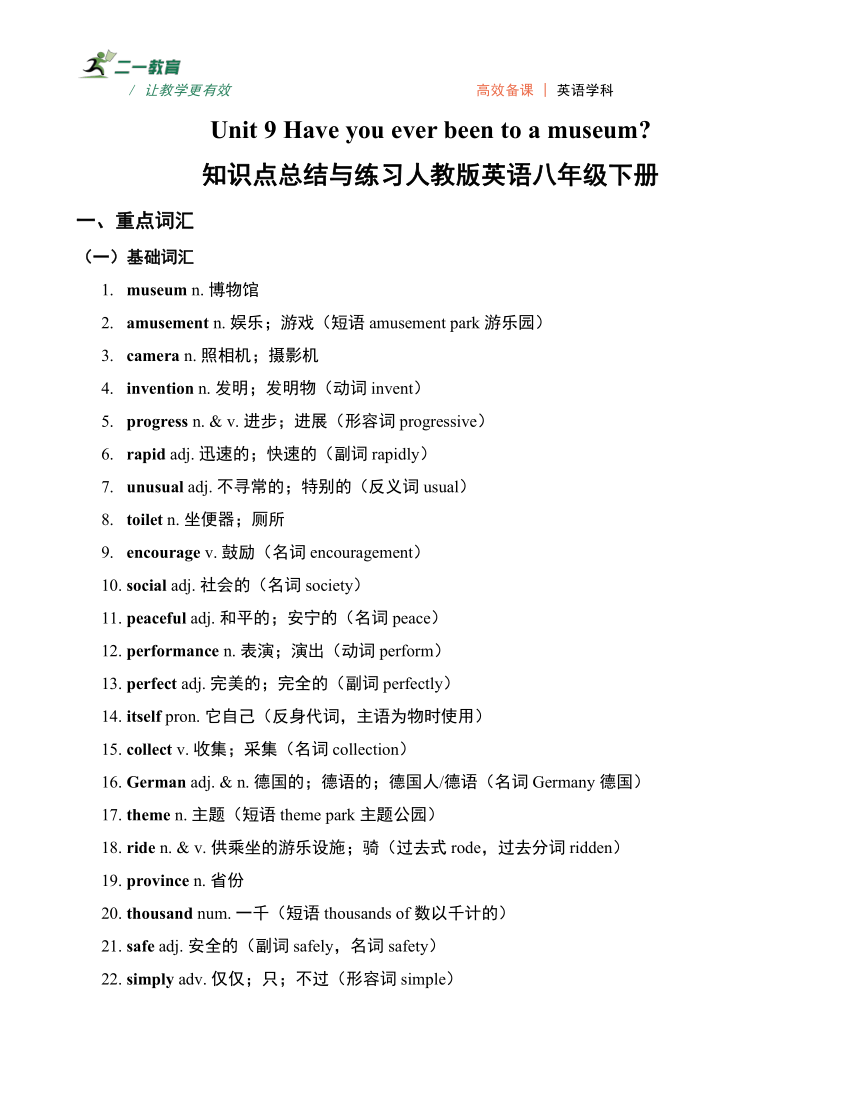
|
|
| 格式 | docx | ||
| 文件大小 | 45.8KB | ||
| 资源类型 | 试卷 | ||
| 版本资源 | 人教新目标(Go for it)版 | ||
| 科目 | 英语 | ||
| 更新时间 | 2025-05-16 08:49:12 | ||
图片预览

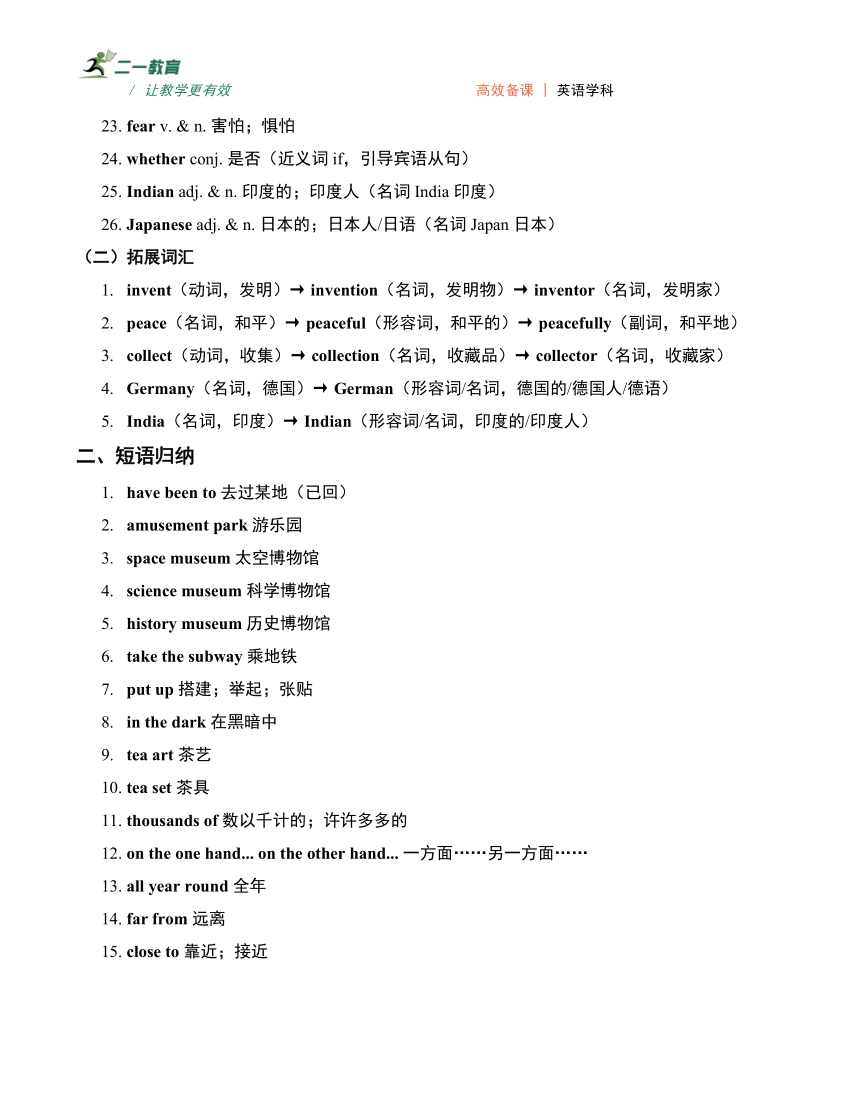
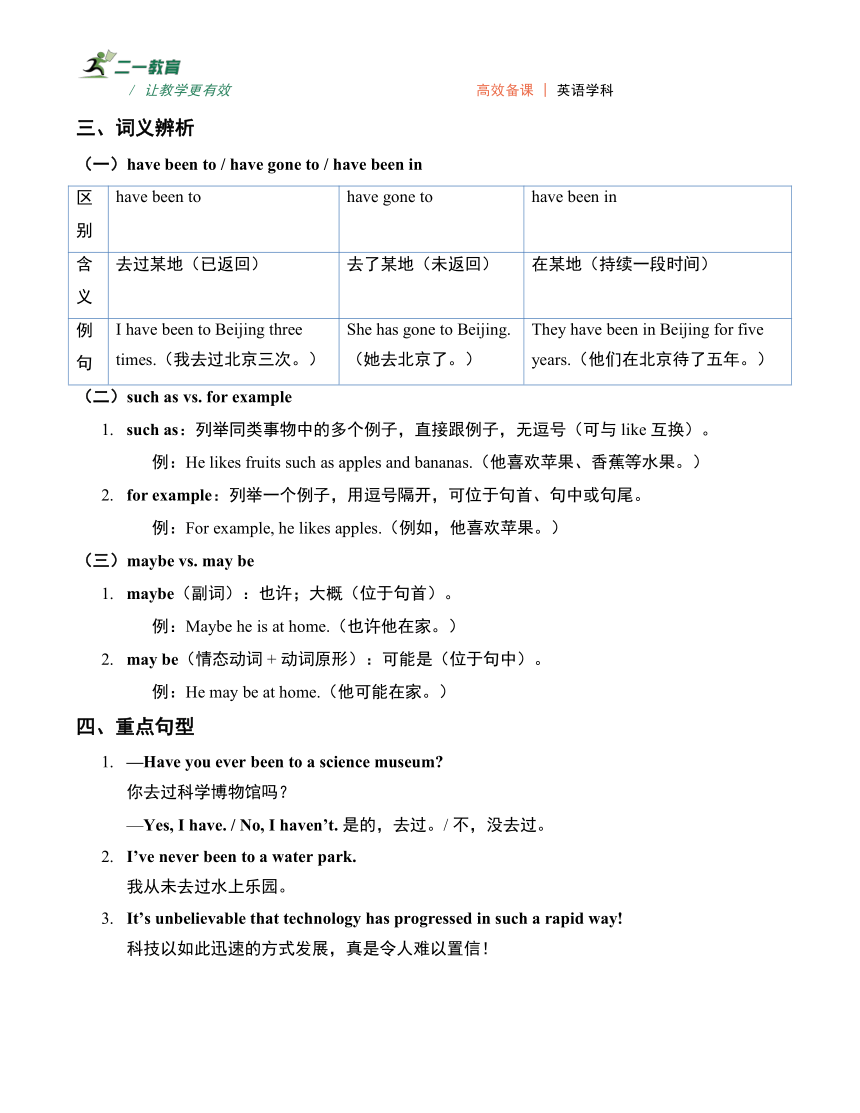
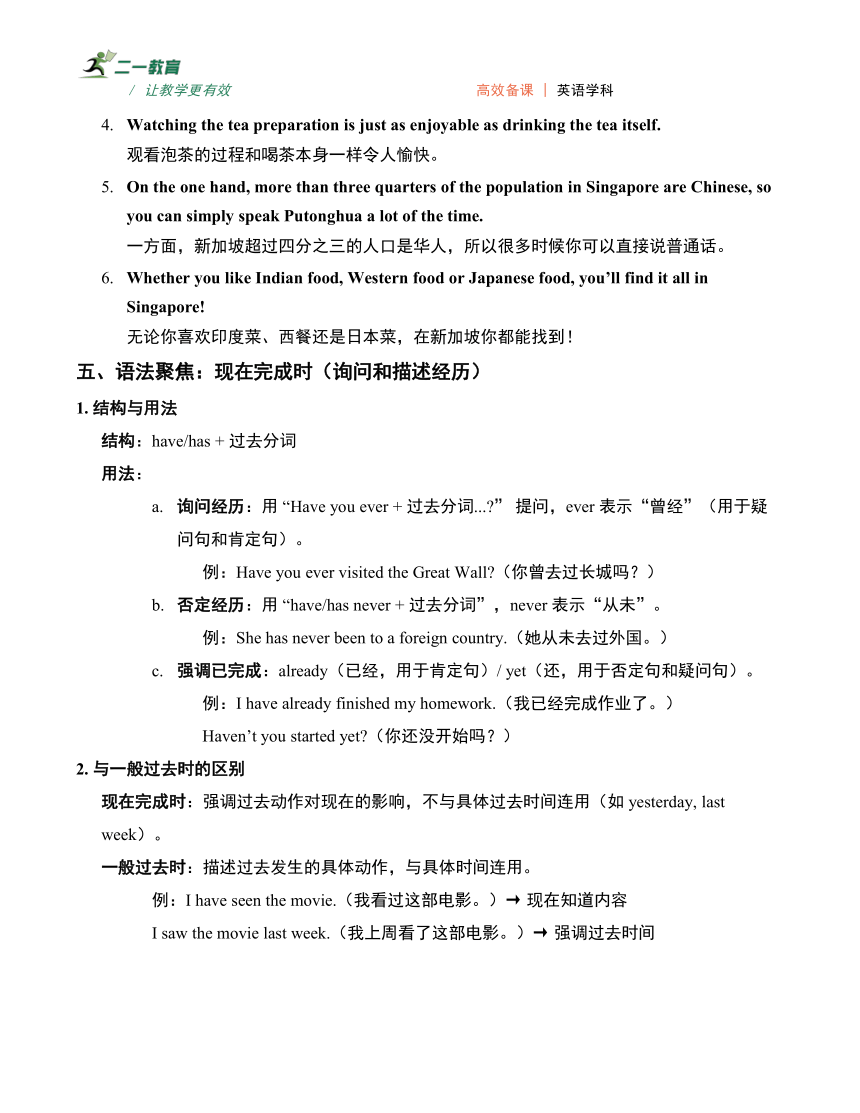
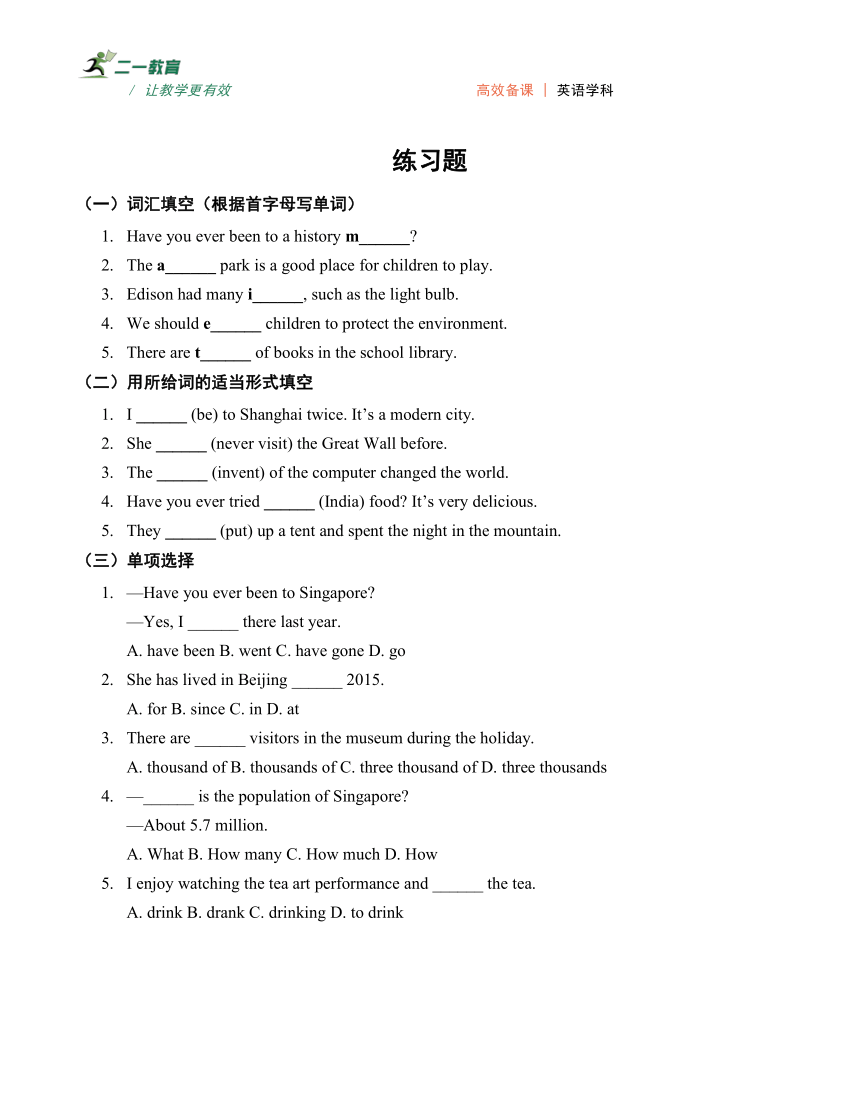
文档简介
/ 让教学更有效 高效备课 | 英语学科
Unit 9 Have you ever been to a museum
知识点总结与练习人教版英语八年级下册
一、重点词汇
(一)基础词汇
museum n. 博物馆
amusement n. 娱乐;游戏(短语 amusement park 游乐园)
camera n. 照相机;摄影机
invention n. 发明;发明物(动词 invent)
progress n. & v. 进步;进展(形容词 progressive)
rapid adj. 迅速的;快速的(副词 rapidly)
unusual adj. 不寻常的;特别的(反义词 usual)
toilet n. 坐便器;厕所
encourage v. 鼓励(名词 encouragement)
social adj. 社会的(名词 society)
peaceful adj. 和平的;安宁的(名词 peace)
performance n. 表演;演出(动词 perform)
perfect adj. 完美的;完全的(副词 perfectly)
itself pron. 它自己(反身代词,主语为物时使用)
collect v. 收集;采集(名词 collection)
German adj. & n. 德国的;德语的;德国人/德语(名词 Germany 德国)
theme n. 主题(短语 theme park 主题公园)
ride n. & v. 供乘坐的游乐设施;骑(过去式 rode,过去分词 ridden)
province n. 省份
thousand num. 一千(短语 thousands of 数以千计的)
safe adj. 安全的(副词 safely,名词 safety)
simply adv. 仅仅;只;不过(形容词 simple)
fear v. & n. 害怕;惧怕
whether conj. 是否(近义词 if,引导宾语从句)
Indian adj. & n. 印度的;印度人(名词 India 印度)
Japanese adj. & n. 日本的;日本人/日语(名词 Japan 日本)
(二)拓展词汇
invent(动词,发明)→ invention(名词,发明物)→ inventor(名词,发明家)
peace(名词,和平)→ peaceful(形容词,和平的)→ peacefully(副词,和平地)
collect(动词,收集)→ collection(名词,收藏品)→ collector(名词,收藏家)
Germany(名词,德国)→ German(形容词/名词,德国的/德国人/德语)
India(名词,印度)→ Indian(形容词/名词,印度的/印度人)
二、短语归纳
have been to 去过某地(已回)
amusement park 游乐园
space museum 太空博物馆
science museum 科学博物馆
history museum 历史博物馆
take the subway 乘地铁
put up 搭建;举起;张贴
in the dark 在黑暗中
tea art 茶艺
tea set 茶具
thousands of 数以千计的;许许多多的
on the one hand... on the other hand... 一方面……另一方面……
all year round 全年
far from 远离
close to 靠近;接近
三、词义辨析
(一)have been to / have gone to / have been in
区别 have been to have gone to have been in
含义 去过某地(已返回) 去了某地(未返回) 在某地(持续一段时间)
例句 I have been to Beijing three times.(我去过北京三次。) She has gone to Beijing.(她去北京了。) They have been in Beijing for five years.(他们在北京待了五年。)
(二)such as vs. for example
such as:列举同类事物中的多个例子,直接跟例子,无逗号(可与 like 互换)。
例:He likes fruits such as apples and bananas.(他喜欢苹果、香蕉等水果。)
for example:列举一个例子,用逗号隔开,可位于句首、句中或句尾。
例:For example, he likes apples.(例如,他喜欢苹果。)
(三)maybe vs. may be
maybe(副词):也许;大概(位于句首)。
例:Maybe he is at home.(也许他在家。)
may be(情态动词 + 动词原形):可能是(位于句中)。
例:He may be at home.(他可能在家。)
四、重点句型
—Have you ever been to a science museum
你去过科学博物馆吗?
—Yes, I have. / No, I haven’t. 是的,去过。/ 不,没去过。
I’ve never been to a water park.
我从未去过水上乐园。
It’s unbelievable that technology has progressed in such a rapid way!
科技以如此迅速的方式发展,真是令人难以置信!
Watching the tea preparation is just as enjoyable as drinking the tea itself.
观看泡茶的过程和喝茶本身一样令人愉快。
On the one hand, more than three quarters of the population in Singapore are Chinese, so you can simply speak Putonghua a lot of the time.
一方面,新加坡超过四分之三的人口是华人,所以很多时候你可以直接说普通话。
Whether you like Indian food, Western food or Japanese food, you’ll find it all in Singapore!
无论你喜欢印度菜、西餐还是日本菜,在新加坡你都能找到!
五、语法聚焦:现在完成时(询问和描述经历)
1. 结构与用法
结构:have/has + 过去分词
用法:
询问经历:用 “Have you ever + 过去分词... ” 提问,ever 表示“曾经”(用于疑问句和肯定句)。
例:Have you ever visited the Great Wall (你曾去过长城吗?)
否定经历:用 “have/has never + 过去分词”,never 表示“从未”。
例:She has never been to a foreign country.(她从未去过外国。)
强调已完成:already(已经,用于肯定句)/ yet(还,用于否定句和疑问句)。
例:I have already finished my homework.(我已经完成作业了。)
Haven’t you started yet (你还没开始吗?)
2. 与一般过去时的区别
现在完成时:强调过去动作对现在的影响,不与具体过去时间连用(如 yesterday, last week)。
一般过去时:描述过去发生的具体动作,与具体时间连用。
例:I have seen the movie.(我看过这部电影。)→ 现在知道内容
I saw the movie last week.(我上周看了这部电影。)→ 强调过去时间
练习题
(一)词汇填空(根据首字母写单词)
Have you ever been to a history m______
The a______ park is a good place for children to play.
Edison had many i______, such as the light bulb.
We should e______ children to protect the environment.
There are t______ of books in the school library.
(二)用所给词的适当形式填空
I ______ (be) to Shanghai twice. It’s a modern city.
She ______ (never visit) the Great Wall before.
The ______ (invent) of the computer changed the world.
Have you ever tried ______ (India) food It’s very delicious.
They ______ (put) up a tent and spent the night in the mountain.
(三)单项选择
—Have you ever been to Singapore
—Yes, I ______ there last year.
A. have been B. went C. have gone D. go
She has lived in Beijing ______ 2015.
A. for B. since C. in D. at
There are ______ visitors in the museum during the holiday.
A. thousand of B. thousands of C. three thousand of D. three thousands
—______ is the population of Singapore
—About 5.7 million.
A. What B. How many C. How much D. How
I enjoy watching the tea art performance and ______ the tea.
A. drink B. drank C. drinking D. to drink
(四)句型转换
I have been to the space museum.(改为一般疑问句)
______ ______ been to the space museum
She has never visited the art museum.(改为反意疑问句)
She has never visited the art museum, ______ ______
Tom went to the zoo yesterday.(用现在完成时改写)
Tom ______ ______ to the zoo.
It’s an unusual museum.(改为感叹句)
______ ______ unusual museum it is!
I like both music and art.(改为同义句)
I like music, and I like art ______ ______.
(五)阅读理解
Have you ever been to Hong Kong It is a wonderful place to visit. There are many interesting places, such as Disneyland and Ocean Park. You can have fun on the rides or watch fantastic shows.
Hong Kong is also a good place to go shopping. You can buy everything from clothes to electronics. The food in Hong Kong is delicious, too. You can try dim sum (点心) or other traditional Chinese food.
If you go to Hong Kong, don’t forget to visit Victoria Peak. From there, you can see the beautiful skyline of Hong Kong. It’s a view you will never forget!
What is the passage mainly about
A. The history of Hong Kong.
B. The food in Hong Kong.
C. Places to visit in Hong Kong.
D. Shopping in Hong Kong.
Which place is mentioned for having fun on rides
A. Victoria Peak. B. Disneyland.
C. The shopping mall. D. The museum.
What can you see from Victoria Peak
A. The traditional Chinese food.
B. The beautiful skyline.
C. The fantastic shows.
D. The electronics stores.
What does the writer think of Hong Kong
A. It’s boring. B. It’s just so-so.
C. It’s wonderful. D. It’s crowded.
(六)书面表达
假设你是李华,你的美国朋友Bob想了解中国的博物馆。请你写一封邮件,内容包括:
介绍你去过的一个博物馆(名称、地点);
描述你在博物馆的经历(看到什么、做了什么);
邀请他来中国参观。
提示重点短语:
have been to
such as
thousands of
all year round
can’t wait to
要求:60-80词,格式正确,语言通顺。
答案及解析
(一)词汇填空
【答案】museum
【解析】根据“历史……”及首字母m,可知填museum(博物馆)。
【答案】amusement
【解析】“……公园是孩子们玩耍的好地方”,amusement park(游乐园)为固定短语,故填amusement。
【答案】inventions
【解析】“爱迪生有许多……,比如电灯泡”,invention(发明物)为可数名词,many后接复数,故填inventions。
【答案】encourage
【解析】“我们应该……孩子们保护环境”,encourage sb. to do sth.(鼓励某人做某事)为固定结构,故填encourage。
【答案】thousands
【解析】“学校图书馆有……书”,thousands of(数以千计的)为固定短语,故填thousands。
(二)用所给词的适当形式填空
【答案】have been
【解析】根据“twice”可知用现在完成时,主语I对应have,故填have been。
【答案】has never visited
【解析】“before”是现在完成时标志,主语she对应has,never后接过去分词visited,故填has never visited。
【答案】invention
【解析】“电脑的……改变了世界”,此处需名词,invent的名词形式为invention,故填invention。
【答案】Indian
【解析】“印度的食物”用形容词Indian,故填Indian。
【答案】put
【解析】“spent”是过去式,put的过去式仍为put,故填put。
(三)单项选择
【答案】B
【解析】“last year”是一般过去时标志,用went,故选B。
【答案】B
【解析】“2015”是时间点,since后接时间点,for后接时间段,故选B。
【答案】B
【解析】thousands of(数以千计的)为固定短语,前有具体数字时thousand不加s,故选B。
【答案】A
【解析】提问人口数量用What’s the population of... ,故选A。
【答案】C
【解析】and连接并列结构,与watching一致用drinking,故选C。
(四)句型转换
【答案】Have you
【解析】现在完成时一般疑问句将have提前,第一人称I变为you,故填Have you。
【答案】has she
【解析】前半句有never(否定),反意疑问句用肯定形式,助动词用has,故填has she。
【答案】has gone
【解析】现在完成时结构为have/has + 过去分词,Tom对应has,go的过去分词为gone,故填has gone。
【答案】What an
【解析】感叹句结构“What + a/an + 形容词 + 可数名词单数”,unusual以元音音素开头,故填What an。
【答案】as well
【解析】both...and...的同义表达,肯定句末尾“也”用as well,故填as well。
(五)阅读理解
【答案】C
【解析】文章主要介绍香港的游玩地点,如迪士尼、海洋公园、维多利亚峰等,故选C。
【答案】B
【解析】根据第一段“such as Disneyland and Ocean Park. You can have fun on the rides”可知,选B。
【答案】B
【解析】由最后一段“From there, you can see the beautiful skyline of Hong Kong.”可知,选B。
【答案】C
【解析】开头“It is a wonderful place to visit.”表明作者认为香港很棒,故选C。
(六)书面表达(略)
(提示:可参考短语“have been to”介绍去过的博物馆,“such as”列举展品,“thousands of”描述游客数量,“all year round”说明开放时间,“can’t wait to”表达邀请的急切。)
Unit 9 Have you ever been to a museum
知识点总结与练习人教版英语八年级下册
一、重点词汇
(一)基础词汇
museum n. 博物馆
amusement n. 娱乐;游戏(短语 amusement park 游乐园)
camera n. 照相机;摄影机
invention n. 发明;发明物(动词 invent)
progress n. & v. 进步;进展(形容词 progressive)
rapid adj. 迅速的;快速的(副词 rapidly)
unusual adj. 不寻常的;特别的(反义词 usual)
toilet n. 坐便器;厕所
encourage v. 鼓励(名词 encouragement)
social adj. 社会的(名词 society)
peaceful adj. 和平的;安宁的(名词 peace)
performance n. 表演;演出(动词 perform)
perfect adj. 完美的;完全的(副词 perfectly)
itself pron. 它自己(反身代词,主语为物时使用)
collect v. 收集;采集(名词 collection)
German adj. & n. 德国的;德语的;德国人/德语(名词 Germany 德国)
theme n. 主题(短语 theme park 主题公园)
ride n. & v. 供乘坐的游乐设施;骑(过去式 rode,过去分词 ridden)
province n. 省份
thousand num. 一千(短语 thousands of 数以千计的)
safe adj. 安全的(副词 safely,名词 safety)
simply adv. 仅仅;只;不过(形容词 simple)
fear v. & n. 害怕;惧怕
whether conj. 是否(近义词 if,引导宾语从句)
Indian adj. & n. 印度的;印度人(名词 India 印度)
Japanese adj. & n. 日本的;日本人/日语(名词 Japan 日本)
(二)拓展词汇
invent(动词,发明)→ invention(名词,发明物)→ inventor(名词,发明家)
peace(名词,和平)→ peaceful(形容词,和平的)→ peacefully(副词,和平地)
collect(动词,收集)→ collection(名词,收藏品)→ collector(名词,收藏家)
Germany(名词,德国)→ German(形容词/名词,德国的/德国人/德语)
India(名词,印度)→ Indian(形容词/名词,印度的/印度人)
二、短语归纳
have been to 去过某地(已回)
amusement park 游乐园
space museum 太空博物馆
science museum 科学博物馆
history museum 历史博物馆
take the subway 乘地铁
put up 搭建;举起;张贴
in the dark 在黑暗中
tea art 茶艺
tea set 茶具
thousands of 数以千计的;许许多多的
on the one hand... on the other hand... 一方面……另一方面……
all year round 全年
far from 远离
close to 靠近;接近
三、词义辨析
(一)have been to / have gone to / have been in
区别 have been to have gone to have been in
含义 去过某地(已返回) 去了某地(未返回) 在某地(持续一段时间)
例句 I have been to Beijing three times.(我去过北京三次。) She has gone to Beijing.(她去北京了。) They have been in Beijing for five years.(他们在北京待了五年。)
(二)such as vs. for example
such as:列举同类事物中的多个例子,直接跟例子,无逗号(可与 like 互换)。
例:He likes fruits such as apples and bananas.(他喜欢苹果、香蕉等水果。)
for example:列举一个例子,用逗号隔开,可位于句首、句中或句尾。
例:For example, he likes apples.(例如,他喜欢苹果。)
(三)maybe vs. may be
maybe(副词):也许;大概(位于句首)。
例:Maybe he is at home.(也许他在家。)
may be(情态动词 + 动词原形):可能是(位于句中)。
例:He may be at home.(他可能在家。)
四、重点句型
—Have you ever been to a science museum
你去过科学博物馆吗?
—Yes, I have. / No, I haven’t. 是的,去过。/ 不,没去过。
I’ve never been to a water park.
我从未去过水上乐园。
It’s unbelievable that technology has progressed in such a rapid way!
科技以如此迅速的方式发展,真是令人难以置信!
Watching the tea preparation is just as enjoyable as drinking the tea itself.
观看泡茶的过程和喝茶本身一样令人愉快。
On the one hand, more than three quarters of the population in Singapore are Chinese, so you can simply speak Putonghua a lot of the time.
一方面,新加坡超过四分之三的人口是华人,所以很多时候你可以直接说普通话。
Whether you like Indian food, Western food or Japanese food, you’ll find it all in Singapore!
无论你喜欢印度菜、西餐还是日本菜,在新加坡你都能找到!
五、语法聚焦:现在完成时(询问和描述经历)
1. 结构与用法
结构:have/has + 过去分词
用法:
询问经历:用 “Have you ever + 过去分词... ” 提问,ever 表示“曾经”(用于疑问句和肯定句)。
例:Have you ever visited the Great Wall (你曾去过长城吗?)
否定经历:用 “have/has never + 过去分词”,never 表示“从未”。
例:She has never been to a foreign country.(她从未去过外国。)
强调已完成:already(已经,用于肯定句)/ yet(还,用于否定句和疑问句)。
例:I have already finished my homework.(我已经完成作业了。)
Haven’t you started yet (你还没开始吗?)
2. 与一般过去时的区别
现在完成时:强调过去动作对现在的影响,不与具体过去时间连用(如 yesterday, last week)。
一般过去时:描述过去发生的具体动作,与具体时间连用。
例:I have seen the movie.(我看过这部电影。)→ 现在知道内容
I saw the movie last week.(我上周看了这部电影。)→ 强调过去时间
练习题
(一)词汇填空(根据首字母写单词)
Have you ever been to a history m______
The a______ park is a good place for children to play.
Edison had many i______, such as the light bulb.
We should e______ children to protect the environment.
There are t______ of books in the school library.
(二)用所给词的适当形式填空
I ______ (be) to Shanghai twice. It’s a modern city.
She ______ (never visit) the Great Wall before.
The ______ (invent) of the computer changed the world.
Have you ever tried ______ (India) food It’s very delicious.
They ______ (put) up a tent and spent the night in the mountain.
(三)单项选择
—Have you ever been to Singapore
—Yes, I ______ there last year.
A. have been B. went C. have gone D. go
She has lived in Beijing ______ 2015.
A. for B. since C. in D. at
There are ______ visitors in the museum during the holiday.
A. thousand of B. thousands of C. three thousand of D. three thousands
—______ is the population of Singapore
—About 5.7 million.
A. What B. How many C. How much D. How
I enjoy watching the tea art performance and ______ the tea.
A. drink B. drank C. drinking D. to drink
(四)句型转换
I have been to the space museum.(改为一般疑问句)
______ ______ been to the space museum
She has never visited the art museum.(改为反意疑问句)
She has never visited the art museum, ______ ______
Tom went to the zoo yesterday.(用现在完成时改写)
Tom ______ ______ to the zoo.
It’s an unusual museum.(改为感叹句)
______ ______ unusual museum it is!
I like both music and art.(改为同义句)
I like music, and I like art ______ ______.
(五)阅读理解
Have you ever been to Hong Kong It is a wonderful place to visit. There are many interesting places, such as Disneyland and Ocean Park. You can have fun on the rides or watch fantastic shows.
Hong Kong is also a good place to go shopping. You can buy everything from clothes to electronics. The food in Hong Kong is delicious, too. You can try dim sum (点心) or other traditional Chinese food.
If you go to Hong Kong, don’t forget to visit Victoria Peak. From there, you can see the beautiful skyline of Hong Kong. It’s a view you will never forget!
What is the passage mainly about
A. The history of Hong Kong.
B. The food in Hong Kong.
C. Places to visit in Hong Kong.
D. Shopping in Hong Kong.
Which place is mentioned for having fun on rides
A. Victoria Peak. B. Disneyland.
C. The shopping mall. D. The museum.
What can you see from Victoria Peak
A. The traditional Chinese food.
B. The beautiful skyline.
C. The fantastic shows.
D. The electronics stores.
What does the writer think of Hong Kong
A. It’s boring. B. It’s just so-so.
C. It’s wonderful. D. It’s crowded.
(六)书面表达
假设你是李华,你的美国朋友Bob想了解中国的博物馆。请你写一封邮件,内容包括:
介绍你去过的一个博物馆(名称、地点);
描述你在博物馆的经历(看到什么、做了什么);
邀请他来中国参观。
提示重点短语:
have been to
such as
thousands of
all year round
can’t wait to
要求:60-80词,格式正确,语言通顺。
答案及解析
(一)词汇填空
【答案】museum
【解析】根据“历史……”及首字母m,可知填museum(博物馆)。
【答案】amusement
【解析】“……公园是孩子们玩耍的好地方”,amusement park(游乐园)为固定短语,故填amusement。
【答案】inventions
【解析】“爱迪生有许多……,比如电灯泡”,invention(发明物)为可数名词,many后接复数,故填inventions。
【答案】encourage
【解析】“我们应该……孩子们保护环境”,encourage sb. to do sth.(鼓励某人做某事)为固定结构,故填encourage。
【答案】thousands
【解析】“学校图书馆有……书”,thousands of(数以千计的)为固定短语,故填thousands。
(二)用所给词的适当形式填空
【答案】have been
【解析】根据“twice”可知用现在完成时,主语I对应have,故填have been。
【答案】has never visited
【解析】“before”是现在完成时标志,主语she对应has,never后接过去分词visited,故填has never visited。
【答案】invention
【解析】“电脑的……改变了世界”,此处需名词,invent的名词形式为invention,故填invention。
【答案】Indian
【解析】“印度的食物”用形容词Indian,故填Indian。
【答案】put
【解析】“spent”是过去式,put的过去式仍为put,故填put。
(三)单项选择
【答案】B
【解析】“last year”是一般过去时标志,用went,故选B。
【答案】B
【解析】“2015”是时间点,since后接时间点,for后接时间段,故选B。
【答案】B
【解析】thousands of(数以千计的)为固定短语,前有具体数字时thousand不加s,故选B。
【答案】A
【解析】提问人口数量用What’s the population of... ,故选A。
【答案】C
【解析】and连接并列结构,与watching一致用drinking,故选C。
(四)句型转换
【答案】Have you
【解析】现在完成时一般疑问句将have提前,第一人称I变为you,故填Have you。
【答案】has she
【解析】前半句有never(否定),反意疑问句用肯定形式,助动词用has,故填has she。
【答案】has gone
【解析】现在完成时结构为have/has + 过去分词,Tom对应has,go的过去分词为gone,故填has gone。
【答案】What an
【解析】感叹句结构“What + a/an + 形容词 + 可数名词单数”,unusual以元音音素开头,故填What an。
【答案】as well
【解析】both...and...的同义表达,肯定句末尾“也”用as well,故填as well。
(五)阅读理解
【答案】C
【解析】文章主要介绍香港的游玩地点,如迪士尼、海洋公园、维多利亚峰等,故选C。
【答案】B
【解析】根据第一段“such as Disneyland and Ocean Park. You can have fun on the rides”可知,选B。
【答案】B
【解析】由最后一段“From there, you can see the beautiful skyline of Hong Kong.”可知,选B。
【答案】C
【解析】开头“It is a wonderful place to visit.”表明作者认为香港很棒,故选C。
(六)书面表达(略)
(提示:可参考短语“have been to”介绍去过的博物馆,“such as”列举展品,“thousands of”描述游客数量,“all year round”说明开放时间,“can’t wait to”表达邀请的急切。)
同课章节目录
- Unit 1 What's the matter?
- Section A
- Section B
- Unit 2 I'll help to clean up the city parks.
- Section A
- Section B
- Unit 3 Could you please clean your room?
- Section A
- Section B
- Unit 4 Why don't you talk to your parents?
- Section A
- Section B
- Unit 5 What were you doing when the rainstorm came
- Section A
- Section B
- Review of Units 1-5
- Unit 6 An old man tried to move the mountains.
- Section A
- Section B
- Unit 7 What's the highest mountain in the world?
- Section A
- Section B
- Unit 8 Have you read Treasure Island yet?
- Section A
- Section B
- Unit 9 Have you ever been to a museum?
- Section A
- Section B
- Unit 10 I've had this bike for three years.
- Section A
- Section B
